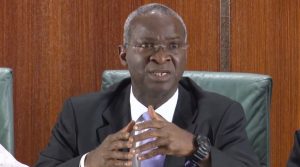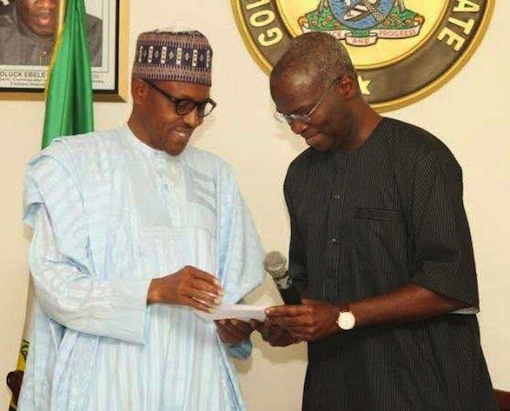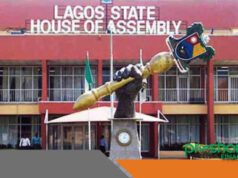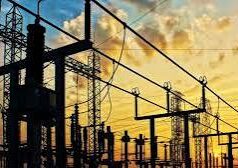
By Ajibola Olarinoye

The position of former Lagos Governor, Babatunde Fashola as a “Super Minister” in the cabinet of President Muhammadu Buhari is being trailed by mixed reactions and is generating some concerns among many Nigerians, most especially, stakeholders in the Power, Works and Housing sectors.
Fashola as a Super Minister is in the front burner due to the fact that the former Governor of the nation’s commercial capital is saddled with the onus of coordinating three most critical Ministries (Power, Works and Housing) that are very crucial to Nigeria’s infrastructural and economic developments. However, the high point of the whole matter is that those aforementioned sectors have seriously gone downhill in Nigeria.
The dilapidated state of these three crucial infrastructural sectors have gone so bad in such a way that it has become a source of embarrassment for the image of the country, and also it is not making the business environment attractive to foreign investors while the existing local and foreign investors are seriously lamenting on how poor infrastructural facilities on ground is stalling the growth of their businesses. Their complaints usually center on the areas of erratic power supply, disorganised housing system and bad roads which analysts have coined as death traps.
For instance; in the area of power supply, Nigerians were not taken aback when a global body rated Nigeria which prides itself as giant of Africa as the second worst in world in the area of electricity supply. The only country in the globe that Nigeria “overcomes” is Yemen; a war torn country in Asia that has been ravaged by series of extremist attacks. The country was rated as the worst globally when it comes to the issue of power supply.
In the Business Expectations Survey Report for Q4 2017, the Central Bank of Nigeria, CBN identified poor power supply as the major albatross that affects the growth of business in Nigeria, adding that 62.6 per cent of the surveyed firms claimed that epileptic supply of electricity is greatly impeding their business activities.
A cursory look at the quantity of megawatt in Nigeria with a population estimation of 180 million people compared to the quantity of what is generated in other countries, speaks volumes on degree of backwardness of the sector in Nigeria.
Paradoxically, the volume of Megawatts (MW) used by some countries that have lower population vastly exceeds that of Nigeria of higher population. For instance: Argentina (32,000 MW, 40 million), Venezuela (23,000 MW, 29 million), Poland (33,000 MW, 38 million), United Kingdom (93,000 MW, 64 million), South Africa (44,000 MW, 51 million), Morocco (6,000 MW, 32 million), Egypt (27,000 MW, 83 million), Libya (6,000 MW, 6 million), Cuba (4,000 MW, 11 million), Iraq (10,000MW, 37 million), South Korea (52,000 MW, 47 million), Ukraine ( 54,000 MW, 49 million), Egypt (18,000MW, 96 million), among others.
If one looks at those figures and simply compared them to that of Nigeria (4,000MW, 180 million), one doesn’t need to have a unique intelligence or acquire a degree before one can easily deduce that the state of power sector in Nigeria is not just in a terrible state, but very absurd.
Secondly, roads which are under the purview of Works Ministry in Nigeria, have a terrible status that is very demeaning and humiliating. As it was pointed out earlier, Nigerian roads have been nicknamed by many Nigerians as ‘death traps’, mortuaries’ or ‘death holes’.
In Nigeria, a journey in which you are supposed to spend an average of three hours on, may take you up to ten hours or more; while a journey that is supposed to take you seven hours, could cost you at least about twelve hours and if you are lucky.
An article titled “Economic Effects of Bad Roads on Vehicle Maintenance in Nigeria” published in the International Journal of Scientific and Research, says that the economic loss caused by bad road network in Nigeria is very enormous, this, apart from thousands of casualties it causes annually in the country.
According to the article, annual losses (from vehicle maintenance), due to bad roads is valued at over N133.8billion. It added that other economic losses from bad roads are caused by air Pollution, delayed movements, armed robbery and incessant accidents on the roads.
Like the two mentioned above, the Housing sector in Nigeria is also in a pickle state. At present, Nigeria’s housing deficit is put at 17 million.
According to the World Bank, to fix Nigeria’s 17 million housing deficit would cost the country a whooping N59.5 trillion. The Federal Mortgage Bank of Nigeria also echoed the same thing, saying that Nigeria needs about N56 trillion to be able to ameliorate the plight of housing deficit in the country.
Matters arising
With all the detailed analysis, it very obvious that these three most crucial infrastructural sectors, are in serious situations that need serious attentions and massive turn-arounds. The situations are causing Nigerians a lot of headache as many are now wondering why all the three sectors are merged together as one Ministry.
While it may be agreed in some quarters that it is not an odd practice in our clime for Ministries to be merged, what set tongues wagging is the nature of the three key Ministries that were put in he hands of Fashola to supervise.
Fashola, is widely believed to be an astute and indefatigable Administrator. Many see him as an idiosyncratic personality and believe that his performance as the Lagos State helmsman was unparallel when compared to many of his predecessors. It is generally believed that his record of service was what impressed President Muhammad Buhari to make him a Super Minister with the three most crucial portfolios.
However, the decision of the present government does not go down well with some stakeholders of the three sectors. Many of them lamented that the combination of the key three infrastructural would bog down the former governor in such a way he may not achieve tangible development in any of the three sectors, most especially the sectors of Housing and Works.
In his words, a former President of Nigerian Institute of Builders (NIOB), Chucks Omeife complained that the appointment of Fashola as the Czar of the three major portfolios is greatly affecting the other two sectors, especially the Housing sector, stating that he has focused more of his attention on the Power sector at the detriment of the other two.
He said: “Let me be frank with you, I don’t envy Fashola at all because the three Ministries that were assigned to him to oversee are very crucial with each of them requiring absolute concentration. It is quite impossible for him to apply his energy on delivering on his mandate without subjecting one or two of the Ministries to neglect’’.
According to Omeife, the ability and brilliance of Fashola cannot be doubted; however, he has not been able to perform much as far as the issue of Housing is concerned, and Works to an extent, noting that it would be very beneficial to be relieved of one or two of the portfolios.
Also lending his voice, a Real Estate Developer, Gbadebo Akinsanya re-echoed Omeife’s voice, he lamented that the present Administration has not been able to address the issue of housing the way it ought to because of the decision of President Muhammadu Buhari to assign the three key portfolios to an individual.
He complained that the yawning gap in the Housing sector is still there because the sector has not been given the serious attention it needed.
Hear him: “Fashola is not a super human, hence the need to relieve him of the Housing Ministry. I say this because as a realtor, I know what it takes to provide housing for the citizenry. He should be allowed to focus on the Power sector and see how far he can deliver in the area of electricity for the country’’.
The upper legislative chamber in Nigeria, which is the Senate is not left behind in the call for the relief of Fashola. In one of its debates on Nigeria’s Power sector, the lawmakers called for the separation of Power Ministry from the other two Ministries so that the needed attention would be given to the Ministry, adding that this would go a long way in addressing the challenges facing the sector.
In the resolution followed by a motion sponsored by Mustapha Bukar, an APC senator representing Katsina state, the Senate urged President Buhari to appoint a separate Minister for the Ministry of Power and allow Fashola to head the sectors of Works and Housing only.
The Senators lamented that the Ministry under the headship of Fashola was usurping the duties of Power related agencies, decrying that this is hampering the efficiency of the sector as regards power generation and supply.
The frustration expressed by the lawmakers is understandable in the sense that the Power sector, which is the most overarching infrastructural element, has not recorded any significant improvement for over two years since Fashola assumed the leadership of the three key portfolios. The national grid has been hovering between 3,000MW to 5,000MW. The highest national peak so far was 5,222.3MW, which was achieved in late December 2017.
It may be a milestone in the context of the Nigerian environment; but it is still a drop in the ocean considering the actual power demand of about 180 million Nigerians. Experts have estimated that Nigeria needs about 60,000 Mega Watts (MW) to satisfy the local electricity demands and this has been estimated to gulp over 100 billion dollars.
Defending his appointment during one of the Town Hall meetings, Fashola said that his position in that Ministry is just to coordinate, noting that the environment is no longer government tightening controlled system; but a system in which the role of the government it to merely coordinate and give directive.
He also added that the merging of the three portfolios is to save cost, adding that anybody who has complaints concerning his appointment of the three key portfolios should address it to President Mohammadu Buhari.
He said: “Whether I can cope with three Ministries or not, let us be clear on this. On the one hand, we have spoken about the cost of running government. And in trying to mitigate or reduce that cost, Mr. President, in his own wisdom, decided to merge three Ministries together.
“So, my work really is supervisory and directional. Today in the Ministry of Works, and in the Ministry of Housing, where there are over 4000 personnel, the number is reducing. The Ministry of Power has barely 800 staff today and the number is reducing as we are gaining traction.
“Two of those Ministries have had a natural relationship over years, they were either Works and Housing, or Lands, Works and something. In adding Power to it, let us remember that essentially the work that is left in Power is just to complete the privitisation and complete the transmission grid,” he added.
He stated further: “The distribution is now in the hands of companies. All of the work that NEPA (National Electric Power Authority) used to do in terms of distributing power is now in the hands of 11 companies. What they used to do in terms of generating power is now in the hands of six companies.”
Some analysts are also of the opinion that Fashola is up to the task no matter how onerous the duty may be, judging by his record as the Lagos Governor for eight years.
For example, in his opinion, a former governorship candidate of the Peoples Democratic Party (PDP) in Lagos, Ade Dosunmu, said he believes that Fashola would perform in his new role. He however pointed out that the laws of diminishing return might overstretch him in the long run.
Dosunmu, stated that the three Ministries combined together for him to coordinate are not as big as Lagos state which Fashola successfully governed for eight years, stating that he believed that the former governor would live up to expectation.
He said: “The President has the discretion to allocate portfolios the way he feels based on his perception of the capacity of individuals. I don’t think anything is too big for Fashola to handle. Here is somebody who has governed Lagos. Those three Ministries put together are not bigger than Lagos. So, I don’t believe it is too big. The only thing is that he is just going to be much overstretched and I pray that he copes. It is a challenge to him and I believe he will live up to expectations.”











